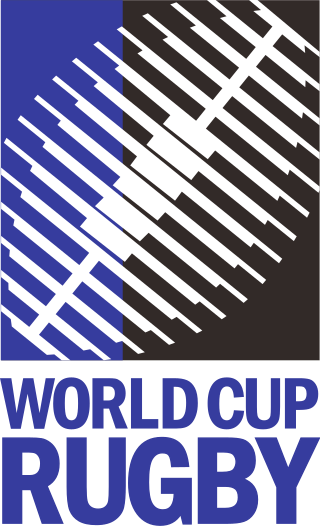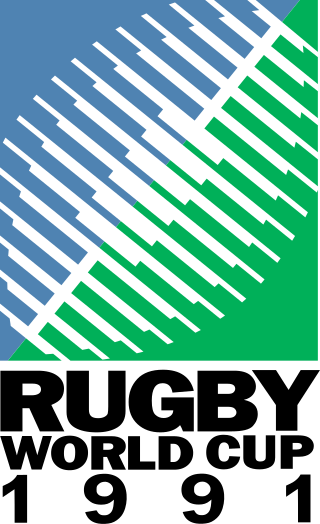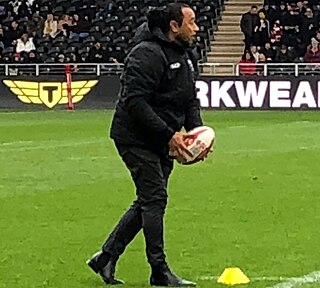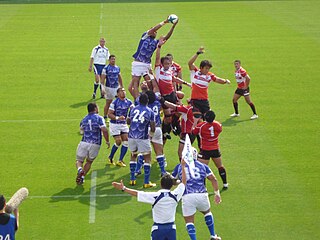
The Rugby Championship, formerly known as the Tri Nations Series (1996–2011), is an international rugby union competition contested annually by Argentina, Australia, New Zealand, and South Africa. These are the four highest ranked national teams in the Southern Hemisphere; the Six Nations is a similar tournament in the Northern Hemisphere.

The 1999 Rugby World Cup, was the fourth Rugby World Cup, the quadrennial international rugby union championship, the first World Cup to be held in the sport's professional era.

The 1987 Rugby World Cup, was the first Rugby World Cup. It was co-hosted by New Zealand and Australia – New Zealand hosted 21 matches while Australia hosted 11 matches. The tournament was won by New Zealand, who were the strong favourites and won all their matches comfortably. New Zealand defeated France 29–9 in the final at Eden Park in Auckland. The New Zealand team was captained by David Kirk and included such rugby greats as Sean Fitzpatrick, John Kirwan, Grant Fox and Michael Jones. Wales finished third, and Australia fourth, after conceding crucial tries in the dying seconds of both their semi-final against France and the third-place play-off against Wales.

The 2008 Rugby League World Cup was the thirteenth staging of the Rugby League World Cup since its inauguration in 1954, and the first since the 2000 tournament. The tournament was held in Australia from 26 October, culminating in the final between Australia and New Zealand on 22 November.

The 1991 Rugby World Cup was the second edition of the Rugby World Cup, and was jointly hosted by England, Scotland, Wales, Ireland and France: at the time, the five European countries who participated in the Five Nations Championship. This was the first Rugby World Cup to be staged in the northern hemisphere, with England the hosts of the final. Also for the first time, qualifying competitions were introduced as the number of entrants had increased from 16 nations four years before to a total of 33 countries. The eight quarter-finalists from 1987 qualified automatically with the remaining eight spots contested through qualifiers by 25 countries. This resulted in only one new side qualifying for the tournament, Western Samoa replacing Tonga. The same 16-team pool/knock-out format was used with just minor changes to the points system. South Africa was again not included because of sanctions imposed on the country by the IRB, due to the government's apartheid policies.

The England national rugby league team represents England in international rugby league.

The Wales rugby league team represents Wales in representative rugby league football matches. Currently the team is ranked 17th in the IRL World Rankings. The team was run under the auspices of the Rugby Football League, but an independent body, Wales Rugby League, now runs the team from Cardiff. Six Welsh players have been entered into the Rugby League Hall Of Fame.

Nigel Faletoese Vagana, also known by the nicknames of "Pablo", and "Chiko", is a former professional rugby league footballer who played in the 1990s and 2000s, as a wing, centre and five-eighth. A New Zealand and Samoa international representative, he retired as the Kiwis' all-time top try-scorer with 19. Vagana played club football in New Zealand for the Warriors, in England for Warrington, and in Australia for the Canterbury-Bankstown Bulldogs, Cronulla-Sutherland Sharks and the South Sydney Rabbitohs. Vagana represented the New Zealand national team 32 times between 1998 and 2006, including playing in the 2000 World Cup. He is also the cousin of Bradford Bulls prop-forward Joe Vagana, and former Silver Ferns netball player Linda Vagana.

The Pacific Nations Cup is an international rugby union competition held between three Pacific states: Fiji, Samoa and Tonga. The 2019 edition of the tournament also included the national teams of Canada, Japan and United States. First held in 2006, the tournament is intended to strengthen the Tier 2 rugby teams by providing competitive test matches in a tournament format.
Rugby World Cup records have been accumulating since the first Rugby World Cup tournament was held in 1987.
The first Rugby Union World Cup was held in 1987, hosted by Australia and New Zealand who pushed for the tournament to be approved. Since the first tournament, 8 others have been held at four-year intervals.

The 1993 Rugby World Cup Sevens was held at Murrayfield in Edinburgh, Scotland, in April 1993. This tournament was the inaugural Rugby World Cup Sevens tournament. The International Rugby Board invited the established rugby union nations but also were keen to involve emerging nations in the event, recognising the fact that Sevens was providing the bridge between the developed rugby nations and those whose rugby union traditions were less well established.

The Papua New Guinea women's national football team is controlled by the Papua New Guinea Football Association (PNGFA). Its nickname is the Lakatois, which is a Motuan sailing vessel. Their home ground is the Sir Hubert Murray Stadium, located in Port Moresby and their current manager is Peter Gunemba. Deslyn Siniu is the team's most capped player and top scorer.

The Samoa national rugby sevens team, referred to as Samoa Sevens or Manu Samoa 7s, competes in the annual World Rugby Sevens Series. Representing the polynesian country of Samoa, with a population of about 202,000, the team competes against some of the wealthiest countries in the world. The Samoa sevens team is overseen by the Samoa Rugby Football Union, which oversees all of rugby union in Samoa.

The Rugby League World Cup is an international rugby league tournament contested by the top national men's representative teams. The tournament is administered by the International Rugby League and was first held in France in 1954, which was the first World Cup held for any form of rugby football.

The 2019 Rugby World Cup, was the ninth edition of the Rugby World Cup, the quadrennial world championship for men's rugby union teams. It was hosted in Japan from 20 September to 2 November in 12 venues all across the country. The opening match was played at Ajinomoto Stadium in Chōfu, Tokyo, with the final match being held at International Stadium Yokohama in Yokohama. This was the first time that the tournament had taken place in Asia and outside the traditional Tier 1 rugby nations.

The 2014 Women's Rugby World Cup was the seventh edition of the Women's Rugby World Cup, and the sixth held in Europe. The World Cup Final took place on 17 August.

The 2003 Rugby World Cup was the fifth Rugby World Cup and was won by England. Originally planned to be co-hosted by Australia and New Zealand, all games were shifted to Australia following a contractual dispute over ground signage rights between the New Zealand Rugby Union and Rugby World Cup Limited. The pre-event favourites were England, regarded by many at the time as the best team in the world. New Zealand, France, South Africa and defending champions Australia were also expected to make strong showings, with New Zealand being second favourites after victory in the southern-hemisphere Tri-Nations championship.
The 2018 OFC Women's Nations Cup was the 11th edition of the OFC Women's Nations Cup, the quadrennial international football championship organised by the Oceania Football Confederation (OFC) for the women's national teams of the Oceanian region. The tournament was held in New Caledonia between 18 November – 1 December 2018.
The 2019 Hong Kong Sevens was a rugby sevens tournament that took place at the Hong Kong Stadium between the 5–7 April 2019. It was the 44th edition of the Hong Kong Sevens, and the seventh tournament of the 2018–19 World Rugby Sevens Series. Sixteen teams competed in the main tournament, while a further twelve competed in a qualifier tournament with the winner getting core team status for the 2019–20 World Rugby Sevens Series.
















